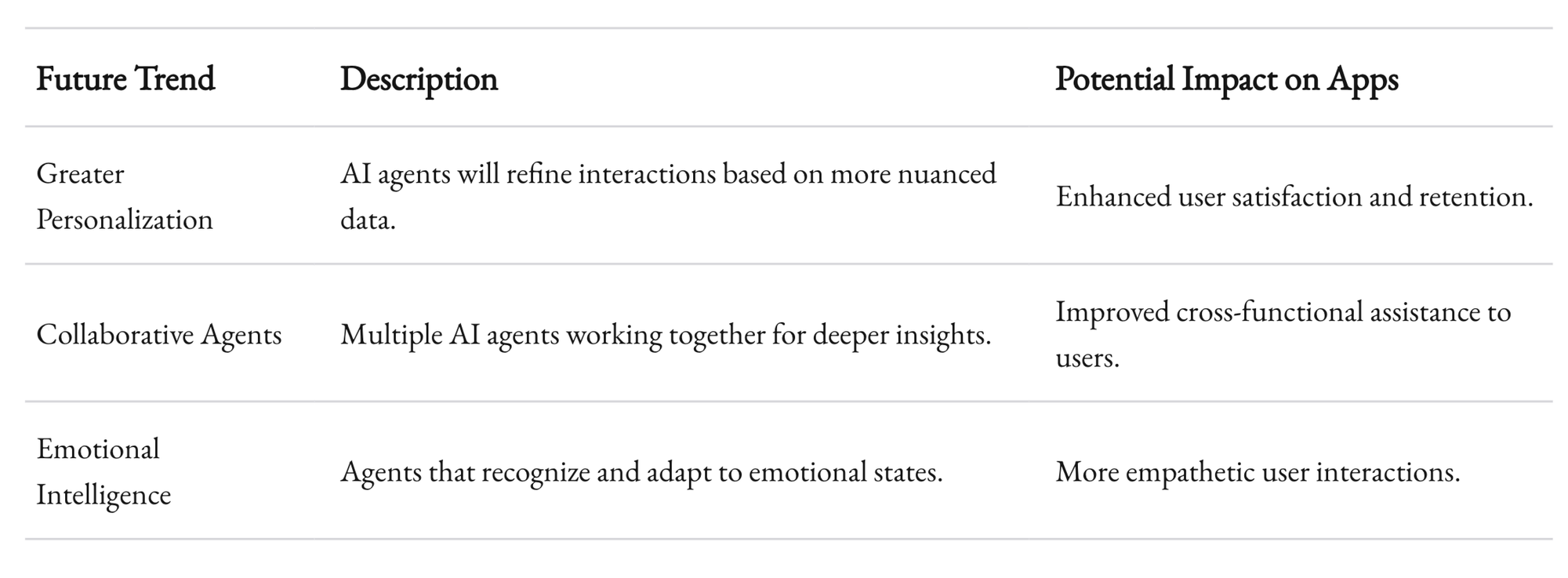Introduction to AI Agents in Mobile App Development

A user opens your mobile app. The AI agent kicks in, almost as if reading their mind, anticipating their needs, guiding them through a smooth experience. It’s not just software; it’s an extension of the user’s intuition—like a well-tuned, invisible assistant. If you run an Outsourced Software Development company like I do at 1985, this kind of efficiency isn't just futuristic, it's the here-and-now necessity that gives your projects an edge.
AI agents are reshaping the way we think about mobile apps, adding an element of personalized interaction that’s both intelligent and human-like. And while we’ve seen buzzwords come and go in the tech world, AI agents have planted roots deep into the soil of mobile innovation. They're not leaving anytime soon.

In this post, we’ll explore what AI agents mean for mobile app development. We’ll talk about how these agents can make apps smarter, why they matter for business impact, and how you, as a developer or stakeholder, can ride this wave. We’ll keep it practical, avoid the fluff, and dive straight into the compelling stuff. Shall we?
What Are AI Agents, Really?
The term “AI agent” might sound like jargon if you haven’t brushed up on AI lately. But it’s simpler than it seems. AI agents are essentially autonomous programs designed to perform specific tasks intelligently. Unlike rule-based bots or scripts, these agents learn, adapt, and make decisions based on the input they receive and data patterns they’ve been trained on.

Take Siri or Google Assistant—they're classic examples of AI agents, blending natural language processing (NLP) with machine learning to handle tasks, answer queries, and even offer a bit of conversation. Now imagine a similar agent designed just for your mobile app—one that knows exactly how your product works, and more importantly, how your users interact with it. These agents can transform how users experience your app, ensuring it's not just another tool but rather something that intuitively helps them reach their goals.

AI agents typically consist of three key components:
- Perception: They gather data through sensors—which could mean anything from natural language to image recognition.
- Reasoning: They make sense of the collected data by accessing algorithms and learned behaviors.
- Action: They decide what to do and execute it, often adapting over time based on user feedback and interactions.
AI agents act like concierge services—invisible but always present. The primary goal is to reduce friction in user interactions. By tailoring these interactions, they make your app feel more personalized, seamless, and almost… alive.

AI Agents in Mobile Apps
The thing about AI agents is that they’re not just cool; they’re effective. They address critical pain points in app usability—those little moments of friction where the user stumbles, gets lost, or loses patience.
Let’s look at this through a real example. Imagine you’re developing a health and fitness app. With an AI agent integrated, your app doesn’t just offer the usual charts and graphs. Instead, the agent checks in proactively. “Hey! Looks like you’ve missed a couple of workouts. How about a quick 10-minute exercise to get you back on track?” That’s proactive nudging—tailored, intelligent, and user-first. It’s what separates great products from forgettable ones.

The underlying value proposition of AI agents is all about reducing the cognitive load for users. People don’t want to think too much. They just want things to work. An AI agent understands a user’s habits and offers help even before the user realizes they need it.
Another use case? Customer support within apps. Users don’t need to navigate complex menus or scroll through endless FAQ sections. Instead, they converse with an agent that knows the specifics of that user’s journey and can offer instant solutions—minus the endless chat queues and ticket numbers. Think about the business value there: reduced churn, greater customer satisfaction, and above all, a genuine connection between product and user.
Key Insight: An AI agent isn’t just a tool. It’s an ecosystem of features that transforms an app from being merely functional to highly empathetic and responsive—an app that evolves with its user.

Integrating AI Agents into Mobile Apps
So, where do we start with AI agents in mobile app development? There’s a lot of nuance to be explored here because integration requires an understanding of both technical and user-experience dimensions.

Step One: Understanding the End Goal
This might sound obvious, but it’s important: know what your AI agent should do. The goal should be very specific to the value proposition of the app. AI for its own sake doesn’t cut it. Your fitness app’s agent needs to motivate users—not deliver weather updates. Your finance app’s agent needs to guide spending habits—not recommend dinner recipes.
You need to answer these questions:
- What critical moments can the AI agent enhance?
- How can the agent align with the broader app value?
- Is the AI agent offering reactive help, proactive assistance, or a mix?
Step Two: Tech Stack Selection
Now, here’s where the real decisions begin. You need to determine the AI frameworks or platforms that align with your project’s goals. Whether you opt for Google’s TensorFlow, OpenAI's API, or Microsoft’s Azure Cognitive Services, the choice depends on the scalability, cost, and complexity you’re dealing with.
A few points to keep in mind when deciding on a tech stack:
- Natural Language Understanding (NLU): If your AI agent is user-facing, it needs strong NLU capabilities. This is where tools like Dialogflow, Rasa, or Wit.ai could come in handy.
- Predictive Modeling: For apps that need behavioral predictions, look into ML libraries that support real-time analytics. TensorFlow and PyTorch have pre-trained models that could speed up development significantly.
- Cloud Integration: Scalability is a key challenge for AI agents. Ensuring that your AI can scale with cloud services like AWS or Azure is crucial to keeping performance optimal.
Step Three: Iterative Training and Deployment
Training an AI agent isn’t a one-time job—it’s iterative. Unlike traditional feature development, AI is about continuous data refinement. The beauty lies in deploying an MVP version of your AI agent and then letting real users interact with it.
AI agents thrive on data. The more they interact, the better they get. But there’s a pitfall: bias and incorrect data. It’s important to monitor how users engage with your agent. Negative interactions need analysis, while positive ones need amplification.

Real-World Applications
AI agents are everywhere, but it’s the nuanced, industry-specific deployments that are the most fascinating. Let's look beyond the usual suspects like Siri or Alexa and dive into a few industry-focused examples:

1. Healthcare Apps
Take Babylon Health, a UK-based mobile health service that uses AI agents to offer pre-diagnoses. The AI agent asks questions, assesses symptoms, and provides suggestions. This isn’t about replacing doctors—it’s about improving access, ensuring users get advice before issues become emergencies. The AI agent serves as a triage that’s accessible 24/7.
2. Financial Services
Financial apps like Cleo are offering AI-driven financial advice—not with boring charts but through a conversational interface. It’s like having a financial buddy who knows your spending habits better than you do and isn’t afraid to give a gentle nudge. Cleo's agent doesn’t just say, "You spent $200 on eating out last month." It offers actionable steps: “Cut back by $50 next month, and you’ll be able to put it into savings.”
3. Travel Industry
Companies like Hopper employ AI agents to assist with predictive pricing for travel. Hopper’s AI continuously scans billions of flight and hotel prices, suggesting the best time to book. The agent not only answers user questions but acts as a dedicated travel assistant, pushing notifications when deals arise.
Pinpoint Insight: The secret behind the successful use of AI agents is the understanding that each industry—health, finance, travel—has unique, nuanced needs. The more focused the use case, the more impactful the AI.
Challenges and Considerations
Nothing’s without its challenges. AI agents have immense potential, but they come with their own set of issues. Data privacy, accuracy, and transparency are just a few that are top of mind.
1. Privacy
When we introduce agents that collect, process, and even act on user data, we’re opening a Pandora’s box of privacy issues. Users need to trust that their data—be it health metrics or personal finances—isn’t being misused. This is why compliance with regulations like GDPR or CCPA isn’t optional. It’s the baseline.
2. Accuracy
Remember Tay? Microsoft’s AI chatbot that got horribly racist in less than a day? AI agents learn from data. And when fed poor or biased data, they give poor or biased outputs. The lesson is simple: training data must be monitored, curated, and constantly refined to ensure your agent acts appropriately.
3. User Trust
Transparency is crucial for user trust. Users want to know why your AI agent made a particular decision or recommendation. It’s not enough for an AI agent to say, “You need to cut back on spending.” It has to provide reasoning: “Based on your financial trends, cutting back will help you save $300 in six months.” The lack of transparency is where AI agents face the most friction.

Future of AI Agents in Mobile App Development
The trajectory of AI agents in mobile apps is something we can only speculate on. But let’s indulge a little. Here's what I think is coming:
- Greater Personalization: AI agents will continue to refine user experience personalization, going beyond just recommending content or products. We're talking about hyper-personalized interactions—anticipating not only needs but also moods, preferences, and context. Imagine an AI agent that adjusts the app interface based on your current focus level—simpler when you're stressed, more detailed when you're not.
- Collaborative Agents: Picture multiple AI agents working together to enhance the experience. For instance, an AI that handles health habits working seamlessly with a financial AI agent to suggest stress-relief purchases without breaking your budget.
- Emotional Intelligence: AI agents are getting emotionally smarter. Companies like Affectiva are working on technology that helps AI agents recognize emotional cues, adjusting their responses to the mood of the user. Imagine an app that gives you financial advice and also knows when you need a little emotional support after a bad day.
AI agents in mobile app development aren’t a flash in the pan; they’re foundational to where the industry is heading. They take on friction points and smooth them out, transforming apps from mere tools into adaptable, intuitive extensions of ourselves.
For developers, this is a new era—an era of creating software that doesn’t just react but interacts, learns, and grows. For users, it’s about an experience that feels more seamless, more human, and ultimately, more useful.
At 1985, we’re constantly thinking about how these technologies impact the future of development. The line between digital assistants, intuitive agents, and human support is blurring, and there’s immense potential here—if you’re willing to explore it deeply.
What if your app didn’t just work for your users, but with them, and on their behalf? What would that look like? With AI agents, it’s not about adding a ‘wow’ feature—it’s about meeting users where they are, and walking beside them.



